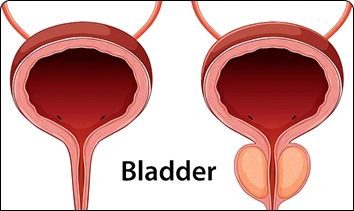Bladder Cancer


Understanding Bladder Cancer
Bladder cancer occurs when abnormal cells in the bladder lining grow uncontrollably, forming tumors. Early detection is essential, as it can spread to nearby tissues or other organs if untreated.
At Dr. Amit Goel – Best UroOncologist in Gurugram, we provide comprehensive care for bladder cancer, including early diagnosis, advanced treatment options, and long-term monitoring to improve outcomes and quality of life.
Common Symptoms of Bladder Cancer
- Blood in urine (hematuria), often painless
- Frequent urination or sudden urge to urinate
- Painful or burning urination
- Pelvic or lower back pain
- Recurrent urinary tract infections
- Unexplained weight loss or fatigue
If you notice any of these symptoms, timely consultation is critical.
Causes & Risk Factors
- Smoking: The leading risk factor for bladder cancer
- Chemical Exposure: Prolonged exposure to industrial chemicals (dyes, paints, rubber, leather)
- Chronic Bladder Inflammation: Long-term infections or bladder stones
- Age & Gender: More common in men over 50
Diagnosis
Accurate diagnosis is key to effective treatment:
- Urine Tests: Detect abnormal cells or blood in urine
- Cystoscopy: Direct visual examination of the bladder lining
- Imaging Tests: Ultrasound, CT scan, or MRI to assess tumor size and spread
- Biopsy: Confirms the type and grade of bladder cancer
Bladder Cancer Treatment Options
Treatment depends on tumor stage, size, and patient health:
A. Transurethral Resection of Bladder Tumor (TURBT)
- Endoscopic (Telescopic) Minimally invasive removal of bladder tumors through the urethra.
- Often the first-line treatment for early-stage bladder cancer
B. Intravesical Therapy
- Medications delivered directly into the bladder to destroy cancer cells
- Includes Intravesical chemotherapy Mitomycin C for Low/Intermediate Grade non Muscle invasive Bladder Cancer
- Intravesical Immunotherapy (e.g., BCG therapy) for High grade Non Muscle Invasive Bladder Cancer.
C. Surgery
- Partial Cystectomy: Removal of part of the bladder affected by cancer .Only for selective cases.
- Radical Cystectomy: Complete removal of the bladder in advanced cases, with Urinary diversion like Ileal Conduit/ Orthotopic Ileal Neobladder.
- Ileal Conduit : Acts as a tube made from a small patch of Ileum (Food pipe) to transfer Urine from Ureter to the outside where it is collected into an External appliance worn on a stoma (Conduit Bag) which can be emptied time to time.
- Orthotopic Ileal Neobladder: A pouch of 400-500cc capacity is remodelled from Ileum (Food pipe) which is made like a globular structure and is positioned inside the body in place of the native bladder(Orthotopic), which collects Urine from ureters and stores it for 400-500cc and then the patient can pass Urine through the normal urethral passage from time to time.
D. Minimally Invasive & Robotic Surgery
- Robotic-assisted/Laparoscopic procedures for minimal blood loss, very small cuts , precise tumor removal with faster recovery. Total Intracorporeal Ileal Conduit and Orthotopic Ileal Neobladder are constructed for smaller cuts and early recovery.
E. Chemotherapy & Immunotherapy
- Systemic treatment for advanced or metastatic bladder cancer to slow progression and improve survival
Follow-up & Monitoring
- Regular cystoscopy and imaging to detect recurrence early
- Lifestyle guidance and ongoing supportive care
Prevention & Long-term Care
- Avoid smoking and exposure to harmful chemicals
- Maintain a healthy lifestyle and balanced diet
- Stay hydrated and manage chronic urinary conditions
- Attend regular bladder screenings, especially if at high risk
